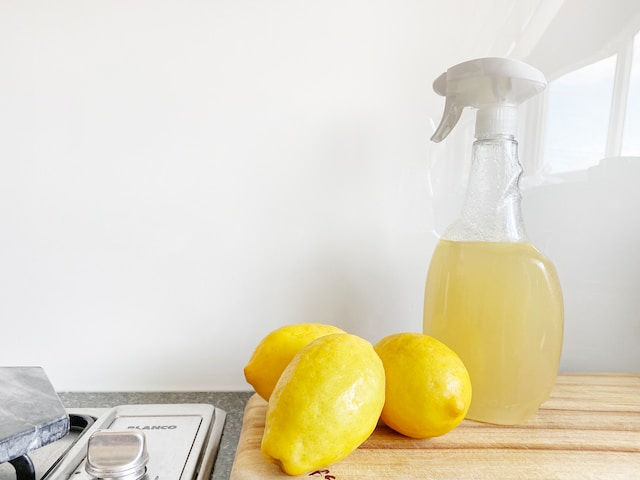
Buzz buzz buzz
Once summertime rolls around in Raleigh, North Carolina, wasps make it their mission to overtake your backyard. With large, expansive hives, they make themselves at home underground, in bushes, atop trees, and even near your home!
However, you don’t have to deal with these winged menaces alone! While we always recommend turning to pest control experts when you have an infestation, there are a few tips and tricks to keep yourself safe until we arrive.
So what smells do wasps hate? What sweet scent could you use to keep them at bay? Check out our blog to learn about wasp-repelling aromas and how to make your own at-home products.
What Smells Do Wasps Hate?
From peppermint to clove, there are enough scents on the grocery store shelves or even in your garden to keep these pesky pests at bay. Take a look at our list to find out the latest and greatest DIY tips to keep wasps away from your home and yard.
Peppermint Oil
Do you know that amazing smell of peppermint that instantly wakes you up and puts a pep in your step? Well, it turns out wasps absolutely can’t stand it!
The strong scent of peppermint throws them off track. Imagine their confusion when they catch a whiff of that minty freshness – it’s like their GPS goes haywire, and they struggle to find their way around.
You have a couple of options to use this peppermint power against wasps.
Grab some peppermint essential oil and a spray bottle. Mix 10-15 drops of peppermint oil with water in the bottle, shake it well, and voila! You’ve got your homemade wasp-repellent spray.
Spritz it around doorways, windows, and other spots where these buzzing creatures try to sneak in. Just remember to give it another spray after rain or a wild windstorm.
If you’re into gardening, here’s a cool trick – plant some peppermint in your yard or near your outdoor hangout spots. Wasps can’t stand the scent of peppermint plants, so it acts like a natural force field against them.
Stick those peppermint plants in pots or make a designated peppermint garden bed, and watch as the wasps think twice before invading your space.
For a more direct approach, take some cotton balls and soak them in peppermint essential oil. Then strategically place these peppermint-soaked cotton balls around areas where wasps congregate or build their nests – think under eaves, near windows, or in those outdoor dining areas where wasps love to crash your picnic.
The scent of peppermint will give them second thoughts about turning your space into their cozy little hideout.
Lastly, you can create peppermint sachets using dried peppermint leaves or peppermint-soaked cotton balls. Toss these sachets near garbage cans, outdoor seating areas, or wherever you’ve spotted these pesky critters. The peppermint scent will act as their personal “no entry” sign.
Remember, while peppermint can work wonders, it’s not a guaranteed wasp banisher, especially if you’re dealing with a significant wasp invasion or a particularly aggressive wasp species. In those cases, it’s wise to call the pros for help.
Citrus
Wait, what smell do wasps hate? Turns out, wasps aren’t big fans of the scent of citrus fruits like lemons, oranges, and grapefruits.
Their distaste for citrus lies in the powerful essential oils present in these fruits. These oils contain compounds that emit strong fragrances, which can overpower the delicate wasp senses.
The pungent citrus aroma makes them think twice before buzzing around your picnic or setting up camp near your outdoor hangout spots.
To make the most of citrus as a wasp repellent, you’ve got a few options:
Citrus Essential Oils: Grab some citrus essential oils like lemon, orange, or grapefruit. Dilute a few drops of the oil in water, and you’ve got yourself a natural wasp deterrent spray. Spritz it around windows, doors, or anywhere you’ve noticed wasps trying to invade your space. It’s like a fragrant force field that tells those wasps, “Sorry, not today!”
Citrus-Scented Candles: Light up some citrus-scented candles during your outdoor activities. The aroma will create a pleasant ambiance and keep those wasps at bay.
Citrus Peels: Don’t toss those citrus peels away just yet! Instead, place them strategically around your outdoor areas. Wasps can’t stand the smell of citrus, so scatter those peels near entry points, picnic spots, or places where wasps gather. The scent will act as a natural repellent and give them second thoughts about crashing your party.
Cloves
What smell do wasps hate? Cloves!
These tiny spice buds are more than just a flavorful addition to your favorite recipes – they also are a natural repellent that wasps can’t stand.
Now, let’s explore a few ways you can use cloves to deter those buzzing pests:
Get your hands on some clove essential oil readily available at many health food stores or online. Mix a few drops of clove oil with water in a spray bottle and shake well.
Then, spray this solution around windows, doorways, or other areas where wasps gather. The strong scent will act as a natural repellent, telling the message that your space is not their preferred hangout spot.
Take advantage of the power of whole cloves by strategically placing them in areas where wasps are a frequent nuisance. For instance, you can stick cloves into an orange or lemon and hang them near outdoor dining areas or places where wasps often linger.
Alternatively, you can create small sachets filled with whole cloves and place them in your backyard, near garbage cans, or anywhere you’ve spotted these pesky insects. The scent of cloves will discourage them from sticking around.
Want to up the ambiance? Light up some clove-scented candles during your outdoor activities. Wasps will find the strong clove fragrance uninviting and choose to buzz off elsewhere.
Lemongrass
With its distinct citrusy scent and refreshing aroma, Lemongrass is a natural repellent that wasps find quite unappealing. The essential oil of lemongrass contains compounds like citral and geraniol, which emit a strong fragrance that overwhelms the delicate olfactory senses of wasps. No more wondering what smells do wasps hate- get ready to take advantage of this option!
To utilize lemongrass for wasp control, you have a few options. Dilute lemongrass essential oil in water and spray it near your porch or deck. Incorporating lemongrass plants into your outdoor landscape strategically can also help repel wasps.
Create sachets filled with dried lemongrass leaves and place them near wasp-prone areas or light lemongrass-scented candles or incense during outdoor activities.
While lemongrass can effectively deter wasps, it’s important to remember that it may not offer complete protection in all situations.
Seeking professional assistance is advisable for severe infestations or aggressive wasp species. Embrace the power of lemongrass to create a wasp-free environment and enjoy the refreshing scent while keeping those buzzing pests at bay.
When to Turn to the Professionals
While dealing with a wasp infestation, knowing when to call in professional pest control assistance is essential. Here are some signs that indicate you should contact a professional pest control agency:
- Large nest size
- Aggressive behavior
- Nest location
- Structural damage
- DIY efforts prove ineffective
Remember, dealing with wasps can be hazardous, and attempting to handle a severe infestation alone may lead to unnecessary risks.
We have the necessary skills, equipment, and expertise to safely and efficiently address wasp infestations in Raleigh while minimizing the potential for stings and property damage. Contact us today to keep the wasps away in North Carolina!





